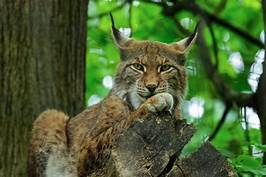Can You Have a Lynx as a Pet?
Lynxes are beautiful and fascinating wild cats that have captured the attention of many people. With their tufted ears, piercing eyes, and sleek fur, it's understandable why some might consider keeping a lynx as a pet. However, this is a complex decision that should not be taken lightly.

Is It Legal to Own a Lynx as a Pet?
The legality of owning a lynx as a pet varies depending on the state or country in which you live. In the United States, for example, it is illegal to own a lynx as a pet in most states. This is because lynxes are considered to be wild animals and are not suited to life in captivity.
The Challenges of Keeping a Lynx as a Pet
Even if it is legal to own a lynx as a pet in your area, there are several challenges that you will need to consider before making a decision.
1. Size and Space Requirements: Lynxes are large cats that require a lot of space to roam and play. A single lynx can require up to 10 acres of land, and they need access to trees and other climbing structures.
2. Diet: Lynxes are obligate carnivores, which means that they must eat meat. Their diet consists mainly of small mammals such as rabbits, mice, and birds. You will need to provide your lynx with a steady supply of fresh meat, and you will also need to supplement their diet with vitamins and minerals.
3. Exercise: Lynxes are very active animals that need a lot of exercise. They will need to be able to run, jump, and climb every day. You will need to provide your lynx with plenty of opportunities to exercise, both indoors and outdoors.
4. Socialization: Lynxes are solitary animals that do not do well in captivity. They can become bored and lonely, which can lead to behavioral problems. You will need to spend a lot of time socializing your lynx, and you will also need to provide them with plenty of toys and enrichment activities.
The Risks of Keeping a Lynx as a Pet
In addition to the challenges of keeping a lynx as a pet, there are also several risks that you should be aware of.
1. Injury: Lynxes are wild animals and they can be dangerous. They have sharp claws and teeth, and they can inflict serious injuries if they are provoked. You will need to be very careful when handling your lynx, and you should always supervise them around children.
2. Disease: Lynxes can carry diseases that can be transmitted to humans. These diseases include rabies, toxoplasmosis, and tularemia. You will need to take precautions to protect yourself and your family from these diseases.
3. Financial Cost: Keeping a lynx as a pet can be very expensive. You will need to pay for food, veterinary care, and a large enclosure. You will also need to factor in the cost of insurance in case your lynx causes any damage or injuries.
Conclusion
Keeping a lynx as a pet is a complex and challenging endeavor. There are many factors to consider before making a decision, and you should be aware of the risks involved. If you are considering keeping a lynx as a pet, it is important to do your research and to consult with a veterinarian or other expert who is familiar with these animals.
Declaration: All article resources on this website, unless otherwise specified or labeled, are collected from online resources. If the content on this website infringes on the legitimate rights and interests of the original author, you can contact this website to delete it.



